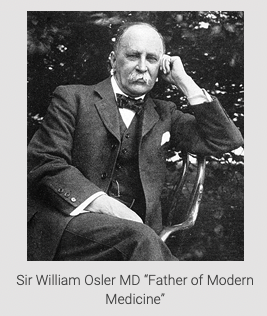 Sir William Osler MD (1849-1919), one of the founders of Johns Hopkins Hospital and Medical School, and acclaimed as the “Father of Modern Medicine,” provides the philosophical inspiration for the American Meditation Institute’s 12th annual Heart and Science of Yoga CME Conference October 17-21, 2023 at the Equinox Resort and Spa in Manchester, Vermont. This proprietary, comprehensive training in Yoga Science as Holistic Mind/Body Medicine, which was recently found in a peer-reviewed clinical study to reduce Burnout and Stress, is accredited by the American Medical Association for 34 CME credit hours, and will be offered simultaneously in-person and virtually on Zoom.
Sir William Osler MD (1849-1919), one of the founders of Johns Hopkins Hospital and Medical School, and acclaimed as the “Father of Modern Medicine,” provides the philosophical inspiration for the American Meditation Institute’s 12th annual Heart and Science of Yoga CME Conference October 17-21, 2023 at the Equinox Resort and Spa in Manchester, Vermont. This proprietary, comprehensive training in Yoga Science as Holistic Mind/Body Medicine, which was recently found in a peer-reviewed clinical study to reduce Burnout and Stress, is accredited by the American Medical Association for 34 CME credit hours, and will be offered simultaneously in-person and virtually on Zoom.
According to lifestyle medicine specialist Mladen Golubic, MD, PhD, “About 80% of chronic diseases are driven by lifestyle factors such as diet and exercise.” Yet, our existing healthcare system still chooses to emphasize pills and procedures almost exclusively, disregarding the sage voice of Sir William Osler, the “Father of Modern Medicine,” who advised a century ago, “Do not ask what disease a patient has, ask what kind of patient has the disease.” Honoring Osler’s intuitive wisdom about the power of the mind and individual lifestyle choices, AMI’s clinically proven conference curriculum of Yoga Science as Holistic Mind/Body Medicine has helped countless physicians and other healthcare providers to reduce burnout and stress. And many have already begun to apply their intuitive knowledge to preventing and even reversing chronic degenerative disease.
Explaining how Sir William Osler’s philosophy of health and wellbeing influenced the creation of AMI’s annual physicians conference, curriculum developer and faculty director Leonard Perlmutter says, “Dr. Osler was an intuitive Yoga Scientist. He could see things as they are, rather than as they appear. Osler’s recommendation to his medical colleagues to give greater emphasis to what kind of patient has the disease, rather than what kind of disease the patient has, clearly indicates to me that this acclaimed diagnostician believed in the innate power within human beings to experience better health. But because of today’s social and economic pressures, in addition to the acceleration of change brought on by new technologies, human beings have forgotten that most health issues actually happen within the mind before they appear on the physical level. The disease of the body occurs as a reaction to the conflicts present in the human mind. Or, as sage Yoga Scientists would have said more than five thousand years ago, ‘All the body is in the mind. The body is a projection of the mind.’”
The dedication, enthusiasm, and teaching methodology of the entire AMI faculty create a dynamic and interactive course heavily influenced by Sir William Osler, and all faculty members are graduates of previous AMI medical conferences. In addition to AMI founder and curriculum developer Leonard Perlmutter, other presenters include: Mark Pettus MD, board certified internist and nephrologist and Director of Medical Education and Population Health of Berkshire Health Systems; Kristin Kaelber MD, PhD, board certified in Internal Medicine and Pediatrics; Renee Rodriguez-Goodemote, MD, Medical Director of the Saratoga Hospital Community Health Center; Anthony Santilli MD, board certified in Pulmonary and Critical Care Medicine; Jesse Ritvo MD, Assistant Medical Director, Inpatient Psychiatry, University of Vermont Health Center; Joshua Zamer, MD, Medical Director for Addiction Medicine at Saratoga Hospital Community Health Center and Chairman of the Department of Family Practice; Jenness Cortez Perlmutter, co-founder and faculty member of The American Meditation Institute; Anita Burock-Stotts, MD, board certified in Internal Medicine; Janine Pardo MD, board certified in Internal Medicine, and Gustavo Grodnitzky PhD, Chair of the AMI Psychological Education Committee.
The conference core curriculum has been endorsed by medical pioneers Dean Ornish MD, Larry Dossey MD, and Bernie Siegel MD. According to orthopedist Steven Lee MD, “This conference was life changing! The knowledge, expertise and compassion of the entire faculty introduced to me a practice and philosophy fundamentally different from the way allopathic medicine views the mind and body.”
